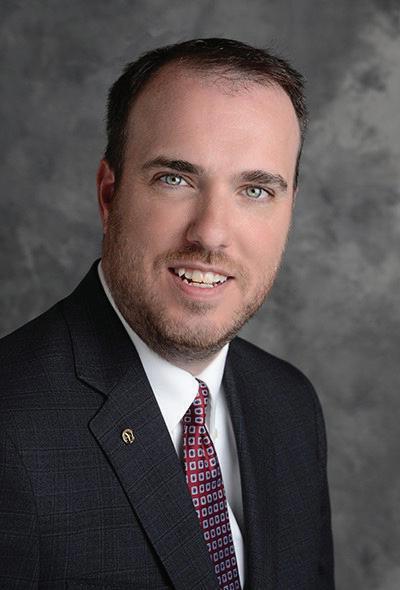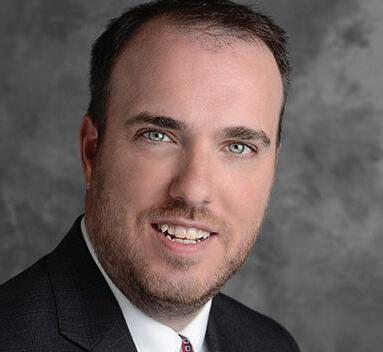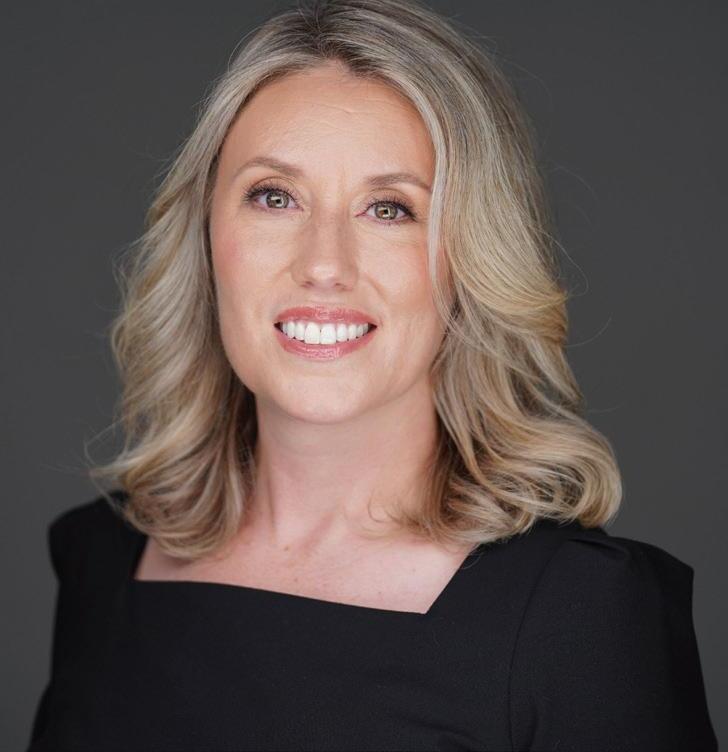

Page 5 SUMMER 2023 Non-deposit investment products are not FDIC insured and are not guaranteed by the bank or any government agency. Non-deposit investment products are subject to investment risk and may go down in value. All rights reserved. Happy State Bank, a Division of Centennial Bank ©2023.
Quarterly Economic Update Page 1 Scott Richardson, CFP®, AIF®
Investment Officer
The Dream Team
Senior Vice President Trust
Scott Richardson, CFP ®, AIF® Senior Vice President Trust Investment Officer

Scott has been in the financial services industry for over 18 years of which the last 16 years has been spent as a financial planner helping clients meet their financial goals. He has a Bachelor of Business Administration from Texas Tech University and is a CERTIFIED FINANCIAL
PROFESSIONAL®
practitioner. His role with Happy Trust Company includes research and security selection, and portfolio management. Scott is the Treasurer for the Golden Spread Council of the Boy Scouts of America. He is also a Past-President of the Amarillo Downtown Kiwanis.
Quarterly Economic Update
In this Q2 recap: The US economy remained resilient in the first half of 2023, setting up a potential for a soft-landing. Continued worries about the banking sector could put that in jeopardy; Short-term treasury rates increase while long-term bonds have stayed steady.
Gross Domestic Product (GDP) for the first quarter came in at 2.0% annualized. This is down from 2.6% in the fourth quarter and 3.7% in the first quarter of 2022. Following two consecutive quarters of negative GDP growth starting in 2022, the year ended with two consecutive quarters of growth. While 2023’s first quarter also displayed growth, marginal growth shows a cooling GDP. Economists are anticipating growth slowing to the point of recession. A growing discussion is whether the economy will experience a soft landing, meaning that the recent Fed rate increases will not evolve into a recession. Should a recession result, economists view such an environment as a hard landing, which is when job expansion and economic growth are hindered.
The Federal Reserve has signaled that it is more concerned about combating inflation than the negative consequences of continued rising rates on the economy.
Inflation expectations among consumers continue to dissipate worldwide, as inflation expectations throughout European and Pacific Rim countries head downward. The Federal Reserve Bank of Atlanta projects a decrease in GDP growth in the U.S. as domestic economic growth recedes.
Concern over additional bank failures has created ongoing uncertainty for equity and bond markets, as the collapse of First Republic Bank in April has become the second-largest bank failure ever, with $229 billion in assets and over $100 billion in deposits.
Federal regulators struck a deal with JPMorgan, the nation’s largest bank, to take over the failed bank and assume its loans and assets. The FDIC and JPMorgan agreed to a loss–share transaction which is projected to maximize recoveries on the assets by keeping them in the private sector. The FDIC estimates that the cost to the Deposit Insurance Fund will be about $13 billion.
Following the failure of Silicon Valley Bank, Signature Bank, and First Republic Bank, banks across the nation have been scrambling to maintain their depositors’ trust and cover losses of depositors’ withdrawals. To acquire short-term funding, many banks have turned to the Federal Reserve’s discount window, a backstop for banks that require liquidity assistance. Banks have been borrowing funds from the Fed’s discount window at levels not seen since the 2008 banking crisis. Once each year, the Federal Reserve conducts a test to assess how large banks are likely to perform
under hypothetical economic conditions. The results of the most recent tests revealed that all the major banking institutions passed this year’s stress test. The tests assumed a hypothetical 10% unemployment rate and a 40% drop in commercial real estate prices.
Earnings of S&P 500 companies came in with 77% topping analyst expectations. Consumer Discretionary and Industrial sectors led the way in earnings growth while Utilities and Materials lagged. The S&P 500 overall experienced a 4% growth rate in the quarter but lagged year over year. Overall, growth rates dropped prompting companies to scrap expansion thoughts.
In May, Congress passed legislation during last-minute negotiations to avert a default on the nation’s debt. The suspension on the U.S. government’s $31.4 trillion debt ceiling is temporary until lawmakers finalize legislation to fund ongoing federal obligations.
The impasse on the debt ceiling added strain to bond and equity markets. Treasury bond yields rose as increasing debt level concerns triggered increased trading in government bonds. Debt ceiling concerns in addition to the uncertainty surrounding regional banks’ exposure to commercial real estate contributed to a volatile environment throughout the month.
There have been several debt ceiling hurdles since the turn of the 20th century. Fortunately, the U.S. has never defaulted on its debt, which means the Treasury would be unable to pay its obligations. However, 2011 saw a point of near default, leading to credit rating agencies’ first downgrade of U.S. debt. In 2013, debates regarding the debt ceiling rose again, with the government experiencing a partial shutdown that led to the furloughing of hundreds of thousands of federal employees until the debt ceiling was suspended. More recently, another government shutdown occurred in 2018 when the debt ceiling yet again failed to be raised. Now, in 2023, the debt ceiling saw a near-default due to political gridlock and differing interests by the main political parties. The resolution to this will delay further debt negotiations until 2025, suspending the debt ceiling and keeping spending largely at its current level.
The Treasury Department plans to issue additional short-term debt to fund immediate federal expenses, with $61 billion in six-month bills and $68 billion in three-month bills already issued as of the first of June. Treasury
1 | Summer 2023
issuances, also known as auctions, are part of the government’s ongoing cash management process. Yields on short-term bonds rose in June as the Fed indicated that it intends to raise rates at least two more instances this year. Longer-term bond yields remained below shorter-term bond yields as confidence in future economic growth faltered.
Interest rates held steady in April with shorter-term rates rising, a result of the Fed expected to make a final rate increase before altering its course. Analysts are carefully tracking economic growth and inflation data to determine what direction the Fed might take. Many believe that the recent increase in rates has already brought about a retraction in economic activity.
The commercial real estate market has begun to show trends of shadow banking on the rise. Shadow banks are characterized as firms that issue short-term loans and invest the proceeds into mortgage-backed securities, which were at the forefront of the 2007-2009 financial crisis. Banking regulations have become more stringent since the financial crisis, yet banks still emerged as a weak link within the financial markets due to high-interest rates and speculative investments. Internationally, the International Monetary Fund (IMF) recently communicated concerns surrounding shadow banking practices in both the U.K. and South Korea.
Equity Update
Concerns surrounding the banking sector in April weighed on equities as additional regional banks looked vulnerable. Currently, the banking sector represents roughly 14% of total stock market capitalization.
Uncertainty with the debt ceiling created volatility in domestic equities, yet still maintained positive year-to-date returns for the S&P 500 Index and the Nasdaq. The Dow Jones Industrial Average was still -0.72% for the year. Major international regional indices such as the MSCI EAFE, the MSCI Europe, the MSCI Pacific, and the MSCI Emerging Markets all maintained positive YTD results through the end of May.
Equity markets reacted to uncertainty in June as major indices saw an increase in volatility. Earnings continue to be a critical focal point as companies struggle to maintain elevated prices while consumer confidence has begun to erode.
Many analysts view the June rise in equities as a momentum rally, meaning that only a few companies have been leading the overall rise in the market. Earnings are becoming extremely critical as companies struggle to maintain higher prices as consumer demand weakens.
A concentration of companies in select sectors has thus far led the market this year, with technology and consumer discretionary stocks exhibiting the largest contribution. Utility and energy sectors lagged as rising rates and decreasing commodity prices hindered the sectors.
Major equity indices are positive for the year, with three sectors leading the broader market. Consumer Staples, Technology, and Communication Services have been the leading sectors thus far, but analysts are uncertain as to how sustainable the advances may be.
KNOW SOMEONE WHO COULD USE INFORMATION LIKE THIS?
Please feel free to send us their contact information via phone or email. (We’ll request their permission before adding them to our mailing list.)
Fixed Income Update
Long-term bond yields held steady in April, while short-term bond yields rose slightly. Analysts view this as an indication that the Fed may still raise short-term rates a bit more yet expect inflation to ease longer term. Yields on the 10-year and 30-year Treasuries had nearly no change in April, yet yields on the 3, 4, 6, and 12-month Treasuries all saw increases.
As expected, the Federal Reserve announced the execution of its final rate increase in early May. Bond markets reacted with lower longterm yields as the Fed’s next move is projected by some analysts to be a reversal of rates. Elevated shorter-term bond yields are also expected to fall should the Fed reverse course. Government bond yields saw an increase in May as discussions surrounding the debt ceiling transpired. Even with the turmoil in May, all bond sectors were still posting positive year-to-date results as of the end of the month. The yield on the 10-year Treasury bond settled at 3.64%, rising slightly as possible increasing costs of borrowing for the government prompted concerns.
Inflation concerns have led the Fed to raise rates again in June as the bond market grapples with the increases. Short-term bond yields have risen relative to long-term bond yields as expectations are that interest rates will be lower in the future. The yield on the 2-year Treasury ended June at 4.87%, while the 10-year Treasury yield was 3.81% at the end of the month. Elevated yields continue to hamper housing with higher mortgage rates and consumer loans. Expectations of easing economic growth and lessening inflation have kept longer-term bond yields lower. •
Global Bond ex U.S. U.S. Bond Market Global Real Estate Emerging Markets International Developed U.S. Stock Market BONDS STOCKS Q2 2023 0.73% -0.84% 0.71% 0.90% 3.03% 8.39% BONDS STOCKS 1 YEAR 1.51% -0.94% -3.02% 1.75% 17.41% 18.95% Summer 2023 | 2
Index Returns
US Stock Market (Russell 3000 Index), International Developed Stocks (MSCI World ex USA Index [net dividends]), Emerging Markets (MSCI Emerging Markets Index [net dividends]), Global Real Estate (S&P Global REIT Index [net dividends]), US Bond Market (Bloomberg US Aggregate Bond Index), and Global Bond Market ex US (Bloomberg Global Aggregate ex-USD Bond Index [hedged to USD]).
2nd Quarter Market Summary
The second quarter brought higher than expected GDP growth at 2.4%. The GDP number has led many to believe that the Federal Reserve has orchestrated a soft-landing for the economy. Time will tell whether this comes true or not. The US stock market saw widespread gains in Q2 with most of the market catching up with the technology stocks that led the way through May. Treasuries saw an increase in rates for the short maturities and saw stability in the long-term bonds.
World Market Capitalization
US Stocks
Ranked Returns for the Quarter (%)
Large Growth (Russell 1000 Growth Index), Large Cap (Russell 1000 Index), Large Value (Russell 1000 Value Index), Marketwide (Russell 3000 Index), Small Value (Russell 2000 Value Index), Small Cap (Russell 2000 Index)and Small Growth (Russell 2000 Growth Index).
International Developed Stocks Emerging Market Stocks
(MSCI Emerging Markets
Index), Value (MSCI Emerging Markets Value Index), Large Cap (MSCI Emerging Markets Index)and Growth (MSCI Emerging Markets Growth Index).
6.39 2.53 0.90 -0.65 Small Cap Value Large Cap Growth Emerging Market Stocks 2.96 3.03 0.49 3.12 Growth Large Cap Small Cap Value International Developed Stocks
12.81 8.58 4.07 8.39 3.18 5.21 7.05 Large Growth Large Cap Large Value Marketwide Small Value Small Cap Small Growth U.S. Stocks
3 | Summer 2023 61% 28% 11% Growth
World ex USA Growth Index), Large Cap
World ex USA
Small Cap
World ex USA
and Value
World ex USA
(MSCI
(MSCI
Index),
(MSCI
Small Cap Index),
(MSCI
Value Index). Small Cap
Small Cap
Meet the Team
Cortney O’Neill joined Happy State Bank and Trust Company in June of 2023 as a Senior Trust Assistant to Megan Simank in the Texas Hill Country region.
Cortney comes to us from the world of marketing, journalism, and special event coordination. For more than 20 years she has worked as a writer. She began her career as a Creative Copywriter, composing advertisements for the San Antonio ExpressNews in their Marketing department. After several years serving in this capacity, she transitioned to freelance journalism so she could stay home to focus on her family. In addition to her journalism career, Cortney also used her skills to coordinate and implement special events for businesses like the San Antonio Express-News and SeaWorld
San Antonio. New to Trust and finance, she brings a unique perspective to building and sustaining customer relationships, a focus on internal and external communications and an eagerness to learn the business.


Cortney earned a bachelor’s degree in Communications with a field of specialization in journalism from the University of the Incarnate Word in San Antonio. Having lived in San Antonio and the Texas Hill Country for most of her life, Cortney relishes opportunities to give back to the local community. Over the years, she and her family have organized food, clothing, diaper and toiletry drives to give aid to those in need. In her free time, Cortney enjoys family game night, gardening, baking, reading, watching movies with her family and snuggling with her dogs •
Jordan Flores was born and raised in Fort Worth, Texas. She graduated from the University of Texas at Arlington with a Bachelor of Business Administration degree in Management and was involved in student organizations, including Women in Business and the American Marketing Association. Upon graduation, Jordan joined Happy State Bank and Trust Company in 2022 as a Trust Administrative Assistant for the Fort Worth market. Prior to joining Happy, she spent four years working in administration for a medical spa. She has continued her education by attending the 2023 Texas Trust School through the Wealth Management and Trust division of the Texas Banker’s Association.
Jordan enjoys attending Estate Planning Teleconferences hosted by Cannon Financial Institute and participating in local Chamber of Commerce events. She partners with Happy State Bank on volunteer opportunities such as the Junior Achievement Financial Literacy program and attended the People’s Law School hosted by the Tarrant County Bar Association. During her free time, she likes to unwind by listening to podcasts, reading books, and playing with her French Bulldogs. Jordan and her husband are also very excited to welcome their baby girl into the world this Fall! •
Jordan Flores
Trust Assistant
Ft. Worth/Ridgmar
Cortney O’Neill
Sr. Trust Assistant Boerne
Summer 2023 | 4
Megan Simank
SVP and Sr. Trust Officer
Megan joined Happy State Bank in April 2023 as a senior trust officer and market manager for the Hill Country and San Antonio markets. Prior to joining Happy, she spent seven years working as a practicing attorney, with four of those years concentrated in estate planning and probate and three spent in litigation and oil and gas. She also brings six years of experience working on the financial side, serving as a senior trust officer in wealth management and as a regional team lead within a national estate settlement department.
Megan graduated from Trinity University with her Bachelor of Arts in Communications and went on to earn a joint JD/MBA from Texas Tech University School of Law and Rawls

College of Business. She holds the Certified Trust and Fiduciary Advisor (CTFA) designation and is licensed to practice law in Texas and Montana. She previously served as a board member for the Estate Planning & Probate Section of the Austin Bar Association. In her new hometown of Boerne, she is a member of 100 Women of the Hill Country and serves as volunteer coach for her daughter’s soccer team. When she is not with her Happy team, you can find Megan on the tennis court or spending time with her daughter, Vivienne, and her wonderful husband, Drew.
The Dream Team
by Megan Simank and Cortney O’Neill
In honor of the 2023 Women’s World Cup, let’s talk about creating your own personal dream team. In my opinion, any individual seeking to grow wealth, protect it, and leave a legacy, should create a financial “dream team” consisting of an estate planning attorney, a CPA and a wealth planner/corporate fiduciary. Your dream team should of course be competent and credentialed, but they should also be decent human beings with whom you enjoy talking to and whom you can trust. You will be sharing with them your greatest goals, your deepest worries… and your account balances. You may even have to air some family business in order to properly implement your plan and that will be much easier with someone you can look in the eye and build a relationship with.
Estate Planning Attorney – Preparing The Playbook
First, this is your gentle reminder that you should have an estate plan in place, and you should review it regularly. Many assume they don’t need an estate plan. The fact is, an estate plan is not just for the ultra-wealthy— an estate plan is for everyone. Maybe you are a single parent with a disabled child, or a wealthy grandparent wanting to leave behind a multi-generational legacy, or a business owner nervous about its management and transition if something happens to you, or a widow without children wanting to leave it all to charity. An estate planning attorney can help you pinpoint your goals and prepare documents that will provide the playbook to your CPA and your wealth manager/fiduciary. These instructions can be implemented during your lifetime and also after you’ve passed.
If you are implementing a plan during your lifetime, you are probably wrestling with what your income needs will be in retirement and how to invest to achieve your goals. Do you have an IRA or 401k? How does it work into your overall estate plan? Are the proper beneficiaries designated? Your attorney, CPA, and wealth manager/fiduciary can work together to achieve investment
objectives and ensure that all is properly titled, designated and administered to avoid unnecessary tax consequences, maximize your returns and fit into your overall plan.
A second big part of these planning conversations for after your passing is who your beneficiaries will be. Would you like your children or grandchildren to receive an inheritance? Or maybe you’d like for a charity (or charities) to benefit. How would you like your assets divided among your beneficiaries? Now is the time to also determine when you would like your assets distributed if a trust is part of your plan. Your attorney will help draft concise instructions regarding when your beneficiaries receive their portion of the trust. Perhaps you’d like your grandchildren to be at an age where they are more financially responsible— maybe 35? —before they receive any assets. Or possibly you’d like to provide earlier distributions to help pay for education or any medical needs that may arise. Taking time to think through this is a wise and necessary move. You’ve worked hard for your assets, and you’d like to see the fruits of your labor benefit your loved ones in the most impactful way possible.
Equally as important as the playbook, are the individuals or entities named in the

5 | Summer 2023
documents to “run the plays” and manage your affairs. In many cases, an attorney may suggest a trust company to serve as a corporate fiduciary, whether it be in the capacity of executor, trustee, agent for investment management, guardian, power of attorney, or a combination of the former. The corporate fiduciary will implement your instructions, investment objectives and manage the relationship with all parties and beneficiaries.
Corporate Fiduciary/Trust Company – Game Time
Having sat in on these planning conversations as an attorney, I can relate to many who balk at the suggestion of a bank serving as a corporate fiduciary. The concerns are more fees, impersonal interaction, and being treated as an account number and not a person. Do we entrust our life’s savings to a corporate entity? If you can find the right company, a corporate fiduciary has many benefits. Having now worked on the other side as a trust officer, I have updated my personal estate plan to include corporate fiduciaries and here’s why:
1. A trust department can serve as a one-stop shop for all of your needs, including specialty asset management (think oil and gas, cotton farms, extensive art collections, you name it), investment management, retirement accounts, and administration of legacy trusts.
2. A trust department has numerous checks and balances in place and is required to adhere to its fiduciary duty in the strictest sense; meaning a trust officer must act in the best interest of the client/beneficiary at all times.
3. Individual fiduciaries are also entitled to fees and may have less access to resources or may lack requisite investment knowledge to manage the assets.
4. Naming a corporate fiduciary removes the burden and liability from family members in what may be a really difficult time— and while everyone “plays nice” now, dynamics frequently change at the passing of a family member. As a “third party” removed from emotion or family involvement, a corporate trustee may be an ideal choice to help keep the peace among family members.
5. Naming a corporate fiduciary ensures that the instructions in the estate plan will be executed impartially and provides a “spigot” to preserve assets for the beneficiaries in case of a spendthrift beneficiary, of course based on the limitations within the governing documents.
6. A corporate fiduciary will ensure that if the trust owner is alive but incapacitated, his or her assets can be marshalled into one place and managed professionally within the set investment objectives for their needs and the needs of your family.
7. A corporate fiduciary can handle the tax filings, distributions, and receipts and has a system in place for record keeping
and reporting of every transaction. A corporate trustee is experienced and specializes in handling every aspect of trust management, from its inception to its closing. While having a corporate fiduciary in place is a great addition to your plan and team, not all are the same. You should be picky. Does your trust company know the end goal? If you don’t know how you want your wealth to work for you, can your trust officer help you define your values and shape goals? Ideally, your trust officer can review your documents and speak with you on what they think the estate plan says. Does it match what you think it says? Does it match what the attorney thinks it says? Does the CPA understand how this would be taxed? What are the tax implications and how do we handle the filings? This is where the team spirit comes in.
You need to find a trust company you feel comfortable with and who is willing to work with your team. It’s important that you have a great relationship with your trust officer, that you both are on the same page as far as asset management and distributions, and that you know that your assets are well cared for. Make sure the trust company will take the time to get to know you, your family, and your beneficiaries. You want someone who has a relationship with you, knows you and your loved ones and can be counted on. For me, this looks like a trust company that has all of the access and resources of a big bank, but feels like a community bank in the sense that I can walk in and have a cup of coffee with my trust officer. I don’t want to get the next customer rep available on the phone. I want to be more than just an account number. It should be a relationship.
Find a trust company that has a plan for your wealth and a course of action to bring your goals to fruition. Do you want to try to aggressively grow your assets or are you content with keeping your money in a less volatile account? A good trust officer can help you find the right investment strategy to help you achieve your objective.
Don’t’ leave your legacy to chance or inexperience. If you are going to take the time to set up a plan, make sure that it is executed to its full potential. The right fiduciary will go beyond just setting up the account, ensuring your assets are properly titled to match your plan and desired beneficiary designations. Getting the right people on to your dream team can take time, but it’s worth it. You worked very hard for your savings. Find people who respect that and will work just as hard to project and grow your savings. I’m proud to work for Happy Trust Company for this reason. We have fun, but we take our jobs very seriously. My colleagues are brilliant and credentialed, but they are also genuinely good people who care about our clients and value the relationships made. It is not just transactional. I’m also proud to say that you are welcome to stop by our office for a cup of coffee, any time. •
6 | Summer 2023
We’re here to help.
Hereford Bovina Dimmit Muleshoe
Canadian Mobeetie
Pampa White Deer Panhandle Shamrock
Amarillo


Canyon Happy Hart Silverton
Wheeler
Amarillo 806-356-8787
Lubbock 806-788-2443
Kerrville 830-353-6755
Dallas 972-407-4947
Fort Worth 817-989-3960
Austin/Round Rock 737-220-9178
Happy Trust Company, a division of Centennial Bank, was established in 2002 dedicated to creating value, improving wealth and protecting your assets. HappyTrust.com
Post
Memphis Turkey
Allen
Kerrville
Austin Round Rock Boerne New Braunfels
Bedford Addison
Olton Plainview Higgins Floydada Lubbock
Tulia Slaton Matador Lockney
Fort Worth Abilene
Fredericksburg
Dalhart Texline Stratford Sunray Dumas
Borger
Tahoka
NO BANK GUARANTEE | NOT A DEPOSIT | NOT FDIC INSURED | NOT INSURED BY ANY FEDERAL GOVERNMENT AGENCY | MAY LOSE VALUE









